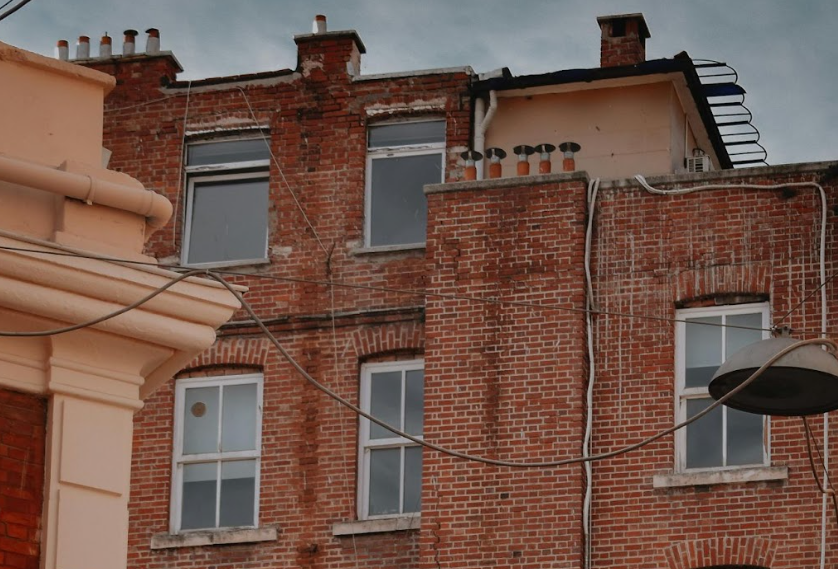
|
Key points:
|
End-of-tenancy cleaning is one of the biggest sources of friction between landlords and residents.
According to the Tenancy Deposit Scheme, around 56% of all cases that it adjudicates are related to cleaning.
At the heart of the issue is poor communication. Most social housing providers have hundreds of residents moving in and out of properties at any one time.
It is difficult to implement systems that ensure each is given clear expectations regarding cleaning.
This article explains everything social housing providers need to know about end-of-residency cleaning laws in the UK. We’ll also explain:
💡How to keep your properties clean.
💡How to avoid disputes with residents.
💡What to do if a resident fails to clean a rental property to the required standard.
What Does the Law Say About End-of-Tenancy Cleaning?

Photo by everdrop GmbH on Unsplash
Residents must ensure that when they leave a property, it has been cleaned to the same standard as when they moved in
The Tenant Fees Act 2019 states:
‘Tenants are responsible for ensuring that the property is returned in the condition that they found it, aside from any fair wear and tear. Fair wear and tear is considered to be a defect
which occurs naturally or as part of the tenant’s reasonable use of the premises.’
In other words:
✔️If a carpet is covered in stains and bits of food, then you can charge the resident for cleaning or replacing it.
❌If a carpet is naturally worn out and old, you cannot charge the resident for cleaning or replacing it.
Can I use a resident’s deposit for cleaning?

Yes, you can use a resident’s deposit for cleaning. The amount you deduct should reflect the level of cleaning required.
You must contact your tenant deposit scheme to claim money from the tenant’s deposit. You need to submit evidence that the property has been returned to you in a different condition than when the resident moved in.
The best way to do this is by creating a property inventory for each home. This is a record of the condition of the elements in your property at the beginning of a tenancy. These elements include things like:
-
Flooring and carpets
-
Worktops and surfaces
-
Shelves and units
-
Walls, including tiled areas
-
Utilities
-
Baths, basins, sinks, etc.
-
Windows and doors
-
Electrical fittings
-
Outdoor areas
It includes photos and a written description of each. This is used as a baseline to measure against when the tenant moves out.
Having a property inventory isn’t a legal requirement. But it can help you avoid disagreements with residents when they come to move out. It also helps avoid legal disputes by providing sound evidence of a property’s condition.
Can I use a professional cleaning clause?

In the past, some landlords included clauses in their tenancy agreements requiring residents to hire a professional cleaning service to ensure their property was returned to its original state when they moved out.
This is now illegal under the Tenant Fees Act and you can be fined up to £5,000 for including such a clause.
Of course, you can advise tenants to use a professional cleaning company before they move out. But whether they choose to do so is up to them.
You can also choose to use a professional cleaning company yourself for peace of mind. However, you cannot automatically charge your resident for this.
What are tenants’ responsibilities?
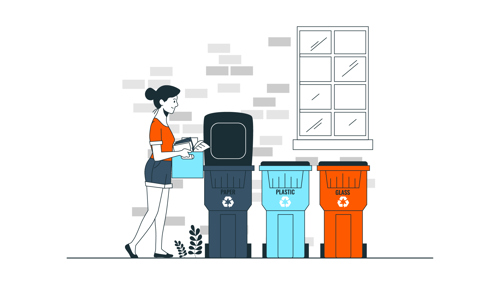
According to government guidance, residents are responsible for keeping their homes ‘reasonably clean’ and for disposing of rubbish.
This is vague, but it’s reasonable to assume that it involves:
-
Cleaning any dirt, spillages, etc. as soon as possible.
-
Preventing the build-up of dust, limescale and other dirt.
-
Removing any scuffs or marks that they have made.
This applies to any part of the property, as well as any furnishings supplied within it.
Your tenants must also ensure that they don’t act in a way that makes the home unsafe.
So if the level of cleanliness poses a health hazard then your tenant may be in breach of their tenancy agreement.
For example, a resident may refuse to put their bins out. This would cause rubbish to accumulate in the house and garden. This could become both a physical hazard and a health hazard.
The first step would be politely reminding the tenant that allowing rubbish to pile up in this way is a hazard. Ask them if there is a reason that they aren’t putting their bins out and if they need help.
If they still don’t take action, then you could be more direct and ask them to remove it.
If they still don’t remove it, you could:
-
Remind the tenant that they could lose some or all of their deposit if the property is unclean when they move out.
-
Apply to a court to force them to fix this, or pay to have it cleaned up.
-
Clean it yourself.
-
Evict the tenant for breach of contract.
It’s likely you would only use the last three options in extreme circumstances. For example, if the tenant has also repeatedly been warned about anti-social behaviour.
Why End-of-Residency Cleaning Is Important
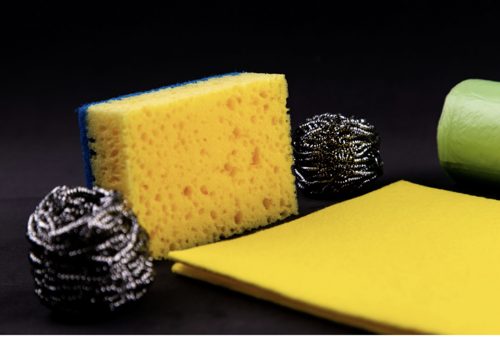
Photo by Volodymyr Hryshchenko on Unsplash
There are several reasons why end-of-residency cleaning is important for social housing providers, including:
-
It ensures your properties are in good condition and ready for the next tenant to move in.
-
It saves you money and resources required to clean properties.
-
It encourages residents to look after the property during their tenancy, so that moving out is stress-free for them.
-
It keeps new and existing tenants happy because they get to live in a clean, tidy home.
How to Keep Your Property Clean
The best way to ensure you don’t have a dispute with a resident over cleaning is to set expectations from the beginning. You can also advise residents on keeping their property clean at regular intervals throughout the tenancy.
Here are some steps you can take to do this:
1. Create an inventory

This involves simply taking pictures of different elements of the property and writing descriptions of their condition.
You can do this yourself or you can use an independent inventory clerk. There are pros and cons to each approach:
-
Do it yourself: This is cheaper, but it’s also time-consuming. It also won’t be considered as reliable by a deposit claim adjudicator because it may be biased towards you.
-
Hiring an independent inventory clerk: This can be more expensive, but it’s less effort and it means your deposit claims evidence will be considered more objective.
You can search for a clerk by visiting the Association of Independent Inventory Clerks website.
2. Agree on standards during resident onboarding

It’s important to clearly explain your cleanliness expectations to residents before they move in.
-
Talk them through the latest version of the property’s inventory and tell them that you expect it to be in a similar condition when they move out.
-
Explain what wear and tear is and make sure they understand the difference between that and cleanliness.
-
Get them to sign an agreement stating that they have seen the inventory and agree to return the property to that condition when they move out.
-
Provide them with a guide to keeping their home clean. Highlight the areas that tenants often forget to clean, including:
-
Skirting boards
-
Light fittings, switches and sockets
-
Cupboards and drawers inside and out
-
Blinds
-
Behind appliances
-
3. Highlight cleaning during inspections
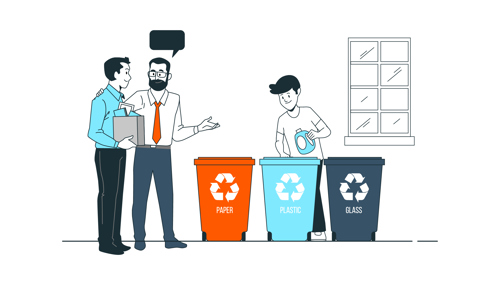
It can be useful to remind tenants about the importance of cleaning and reporting maintenance issues during inspections.
However, everyone has different standards and people should be allowed to live how they want to in their own home - so avoid lecturing your residents on cleanliness.
Only point out mess that could be a health and safety hazard. Politely explain the risk they are creating and ask them to clean it.
How to Perform an End-of-Tenancy Inspection
Just before the resident moves out, inspect their property to ensure it is as clean as it was when they moved in.
You may find it useful to use a tenancy cleaning checklist during your inspection. This ensures nothing is missed in the cleaning process.
It’s a good idea to give your resident plenty of notice and remind them of what is expected.
You should also leave some time between the inspection and the resident’s moving date. This gives them time to rectify anything that hadn’t been cleaned properly during the inspection.
What are the rules on cleaning communal spaces?
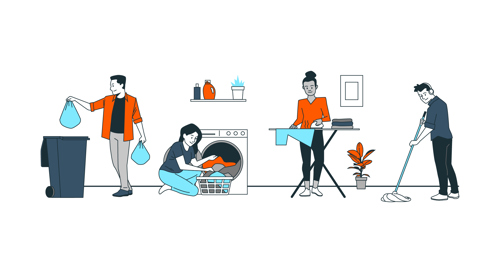
If you own a house of multiple occupancy (HMO) or similar property then you may have communal areas. There is often confusion over whose responsibility it is to keep these areas clean.
-
The property owner is ultimately responsible for keeping communal areas clean.
-
However, many tenancy agreements state that tenants should help keep communal areas clean - for example, by cleaning up after themselves.
-
If your residents have a joint tenancy then they may be jointly responsible for the communal areas under their tenancy agreement. However, this can lead to disagreements between residents.
Conclusion
Ensuring your residents keep your properties clean is all about preparation and good communication.
Making sure that you have a comprehensive property inventory and that your residents understand what is expected of them will help avoid disputes in future.
Keeping your social housing properties clean is one way to provide good housing and a great tenant experience. It also ensures that residents treat them with respect.
But you also need to ensure they are well-maintained. That’s where EVO comes in.
We provide a digital platform that landlords can outsource all of their repairs and maintenance to. It ensures repairs are carried out quickly and efficiently, and residents are kept informed throughout the process.
Here’s how it works:
✔️Residents can quickly and conveniently request a repair using a mobile phone app.
✔️The next available suitably qualified tradesperson is automatically notified.
✔️Residents select three different time slots that are convenient for them.
✔️The tradesperson is sent all of the information they need to complete the repair, including pictures, videos and information on the property.
✔️The resident can choose to be at home to let the tradesperson in, or leave a key at a secure exchange point.
✔️The resident is kept informed throughout the job.
✔️All work is checked, signed off and given a 12-month warranty by EVO directly.
Contact us today to find out how EVO can help you keep your properties in great condition.
End of Tenancy Cleaning FAQ
Can a landlord charge a cleaning fee after a tenant moves out in the UK?
In the UK, as of June 1, 2019, landlords cannot enforce a professional cleaning clause that mandates residents to pay for tenancy cleaning services. The Tenant Fees Act made such clauses illegal. However, landlords still have the right to use a tenant's deposit for professional cleaners if the property is left in an unsatisfactory condition, considering normal wear and tear. The amount deducted must align with the cleaning required, as documented in the inventory or check-in report.
How clean should a tenant leave a property?
At the end of a tenancy, tenants are responsible for returning the property in the same state to when they moved in. Fair wear and tear is expected, but intentional damage or neglect may result in deductions from the deposit. While legislation doesn't specify a detailed cleaning standard during the tenancy, departing tenants are advised to ensure the property is as clean as possible to avoid disputes, secure their deposit, and obtain a positive reference for future rentals.
Who pays for end-of-tenancy cleaning in the UK?
Since June 1, 2019, tenants in the UK cannot be compelled to pay to have the property professionally cleaned as part of their tenancy agreement. The Tenant Fees Act prohibits landlords from including such clauses. However, tenants are encouraged to leave the property in a clean state to avoid potential deductions from their deposit and to secure a positive reference from the landlord for future rental applications.
What is the landlord's responsibility for cleaning?
Landlords are obligated to ensure their property is in a clean and habitable condition for new tenants. However, during the tenancy, there's no legal duty for tenants to maintain a specific level of cleanliness. Landlords can address cleanliness issues during inspections, but legal recourse is limited until the end of the tenancy. Landlords can use the tenant's deposit for professional cleaning if the property is not left in a satisfactory condition, considering fair wear and tear.
What is expected in an end-of-tenancy clean?
An end-of-tenancy clean should cover every aspect of the property, ensuring it is returned to a pristine state. The checklist includes cleaning walls, doors, and ceilings, attending to fixtures, fittings, and furnishings, deep-cleaning bathrooms and kitchens, and addressing carpets. A thorough cleaning regimen also involves paying attention to the outside of the property, ensuring a favourable first impression for prospective tenants.
Can I be charged for cleaning at the end of tenancy?
Landlords have the right to use a tenant's deposit to cover cleaning costs if the property is left in an unsatisfactory condition, considering fair wear and tear. Deductions must be reasonable and well-documented in the inventory or check-in report. While tenants cannot be forced to pay for professional cleaning, ensuring the property is as clean as possible before departure can prevent disputes and help maintain a positive rental history.
Is an end-of-tenancy clean worth it?
Whether tenants opt for a DIY cleaning approach or hire professionals depends on individual preferences, time constraints, and cleaning standards. While a DIY method may be cost-effective, a professional clean ensures a stress-free, top-quality result. Tenants who invest in a thorough clean not only avoid disputes and deductions from their deposit but also increase their chances of obtaining a positive reference for future rentals.
Should a tenant clean before leaving?
Tenants are strongly advised to clean the property before leaving to ensure its cleanliness matches the condition at the start of the tenancy. While there's no legal obligation for tenants to maintain a specific level of cleanliness during the tenancy, departing with a clean property helps avoid disputes, secure the full deposit refund, and obtain a positive reference for future rentals.
PHOTO BY EVO

